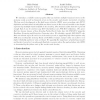Free Online Productivity Tools
i2Speak
i2Symbol
i2OCR
iTex2Img
iWeb2Print
iWeb2Shot
i2Type
iPdf2Split
iPdf2Merge
i2Bopomofo
i2Arabic
i2Style
i2Image
i2PDF
iLatex2Rtf
Sci2ools
116
Voted
DFT
2007
IEEE
2007
IEEE
Fault Secure Encoder and Decoder for Memory Applications
We introduce a reliable memory system that can tolerate multiple transient errors in the memory words as well as transient errors in the encoder and decoder (corrector) circuitry. The key novel development is the fault-secure detector (FSD) error-correcting code (ECC) definition and associated circuitry that can detect errors in the received encoded vector despite experiencing multiple transient faults in its circuitry. The structure of the detector is general enough that it can be used for any ECC that follows our FSD-ECC definition. We prove that two known classes of Low-Density Parity-Check Codes have the FSD-ECC property: Euclidean Geometry and Projective Geometry codes. We identify a specific FSD-LDPC code that can tolerate up to 33 errors in each memory word or supporting logic that requires only 30% area overhead for memory blocks of 10 Kbits or larger. Larger codes can achieve even higher reliability and lower area overhead. We quantify the importance of protecting encoder ...
Related Content
| Added | 02 Jun 2010 |
| Updated | 02 Jun 2010 |
| Type | Conference |
| Year | 2007 |
| Where | DFT |
| Authors | Helia Naeimi, André DeHon |
Comments (0)

